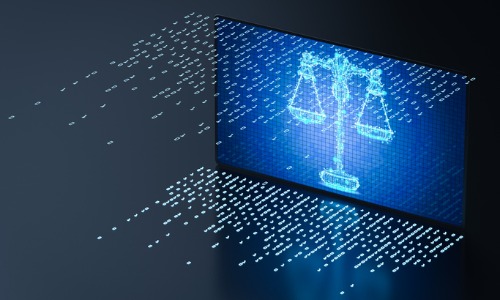The Implications of Generative AI: From the Delivery of Legal Services to the Delivery of Justice
 Arati Prabhakar, Director of the White House Office of Science and Technology Policy (OSTP), recently referred to artificial intelligence (AI) as “one of the most consequential technologies of our times.” While AI is not new, we have seen advances in generative AI at an astonishing rate over the last year. The potential for AI’s impact is broad, as it has the ability to impact every aspect of human life, from home to work. It will impact our relationships to everything and everyone in our world. The implications for generative AI on the legal system, from how we deliver legal services to how we deliver justice, will be just as far reaching.
Arati Prabhakar, Director of the White House Office of Science and Technology Policy (OSTP), recently referred to artificial intelligence (AI) as “one of the most consequential technologies of our times.” While AI is not new, we have seen advances in generative AI at an astonishing rate over the last year. The potential for AI’s impact is broad, as it has the ability to impact every aspect of human life, from home to work. It will impact our relationships to everything and everyone in our world. The implications for generative AI on the legal system, from how we deliver legal services to how we deliver justice, will be just as far reaching.
In his 2023 Year-End Report on the Federal Judiciary, Chief Justice John Roberts focused on the potential for technology to dramatically change our work and life:
[N]ow we face the latest technological frontier: artificial intelligence (AI).… Law professors report with both awe and angst that AI apparently can earn Bs on law school assignments and even pass the bar exam. Legal research may soon be unimaginable without it. AI obviously has great potential to dramatically increase access to key information for lawyers and non-lawyers alike. But just as obviously it risks invading privacy interests and dehumanizing the law.
The ABA Model Rules of Professional Conduct require that “to maintain the requisite knowledge and skill, a lawyer should keep abreast of changes in the law and its practice, including the benefits and risks associated with relevant technology.” As with the advent of past technologies, lawyers will need to keep abreast of these impacts, including the benefits and risks, and incorporate AI into their law and practice.
Leaders across the legal profession and justice system have already established numerous task forces and committees to study, understand, and speak to the opportunities, challenges, and risks posed by generative AI. The American Bar Association (ABA) has established the ABA Task Force on Law and Artificial Intelligence to “make recommendations and articulate principles to help ensure that the creation and incorporation of AI is done in accordance with the law and well-accepted legal standards.” The task force has focused in on a number of areas of focus, including: 1) AI and the Legal Profession, 2) AI and Access to Justice, 3) AI Governance, 4) AI Challenges: Generative AI, 5) AI and Legal Education, 6) AI Risk Management, and 7) AI and the Courts.
State bar associations are following suit. The California Bar just recently approved the comprehensive Practical Guidance for the Use of Generative Artificial Intelligence in the Practice of Law, serving as the first regulatory agency sanctioning the use of AI tools for legal professionals. The guidelines touch on confidentiality, competence, compliance with the law, communication, duties regarding supervision, billing practices, candor to the tribunal, and a prohibition on discrimination. The guidance addresses the impact of AI on efficiency and the resulting impact on billing directly:
A lawyer may use generative AI to more efficiently create work product and may charge for actual time spent (e.g., crafting or refining generative AI inputs and prompts, or reviewing and editing generative AI outputs). A lawyer must not charge hourly fees for the time saved by using generative AI.
Similar guidance is provided on candor to tribunals:
A lawyer must review all generative AI outputs, including, but not limited to, analysis and citations to authority for accuracy before submission to the court, and correct any errors or misleading statements made to the court.
Lawyers must also check for rules, orders, or other requirements in their relevant jurisdictions, as a growing number of judges have issued standing orders regarding the use of artificial intelligence in litigation.
The New York State Bar Association has similarly established a Task Force on Artificial Intelligence to examine the legal, social, and ethical impact of AI on the legal profession. And the Florida Bar Association’s Board of Governors has approved Ethics Advisory Opinion 24-1, which speaks to confidentiality, oversight of Generative AI, legal fees and costs, and lawyer advertising. For those who are in states that have not yet developed guidance, these leading efforts provide thoughtful guidance.
Courts, judges, and national court organizations have likewise taken up the charge to understand and respond to AI and its influence on the law, ethics, the court, and the delivery of justice. The National Center for State Courts, the Conference of Chief Justices, and the Conference of State Court Administrators have launched an AI Rapid Response Team, which has already developed interim guidance talking points and a collection of resources for state courts. CCJ President and AI RRT Co-Chair Anna Blackburne-Rigsby, Chief Judge of the D.C. Court of Appeals, notes that “Artificial intelligence is already impacting the courts, and we must be prepared and forward-thinking when it comes to addressing how AI can be used effectively, efficiently, and ethically to promote the administration of justice.”
To this point, the Joint Technology Committee, established by the Conference of State Court Administrators (COSCA), the National Association for Court Management (NACM), and the National Center for State Courts has recognized AI as a priority area. COSCA will be issuing a policy paper on AI and the Courts in 2024, and NACM will issue practical guidelines on the topic and its relation to the delivery of justice in our courts.
As these entities seek to understand the challenges and opportunities of AI, as well as issue specific guidance, lawyers in their own practices also need to understand the implications on the daily practice of law. As AI grows more sophisticated, it will accelerate and compress the completion of tasks, including legal tasks. For lawyers, this will result in radical changes to our productivity and how we do work, which directly impacts how legal matters are staffed and how clients are billed. Law.com conducted a survey of the Am Law 100 law firms to learn how they are using generative AI, and 41 firms confirmed that they have begun employing generative AI, although Law.com noted that the actual number is likely much higher. Generative AI has the ability to accelerate the completion of legal tasks, and lawyers are using it to research matters, draft documents, and generate transcripts. The most commonly noted concerns include bias, deciding how to price services that are enhanced by generative AI, the lack of transparency in how generative AI produces outputs, and security and confidentiality of client and firm data.
As legal sector analyst Jordan Furlong has noted, there is also great opportunity for lawyers to use generative AI as a personal assistant to supercharge their productivity, so as to spend less time on nonlegal tasks. The goal here should not be to increase productivity in the “backbreaking way” that we have traditionally viewed productivity in law firms, but to “increase a lawyer’s productivity by enhancing the lawyer’s creativity in order to better serve clients.” Furlong has poignantly highlighted the crux of the issue of AI—and the potential it has for transforming how we think about the delivery of legal services and the law firm model:
When you can no longer sell the time it takes to achieve a client’s outcome, then you must sell the outcome itself and the client’s experience of getting there. That completely changes the dynamics of what law firms are all about.
The work of low-level associates is particularly vulnerable, and as the completion of these basic legal tasks changes rapidly, we will need to reframe the work and contributions of associates. This means, by necessity, that we need to rethink how lawyers are trained, both within our firms but also legal education as a whole. We are excited to have launched IAALS’ Foundations 2.0 project, which will provide a comprehensive updated view of the skills and competencies new lawyers need to succeed and serve clients well in this rapidly evolving legal profession.
We also must think about implications on a broader scale for our justice system. AI is already impacting litigation, from discovery to authentication and admissibility. The federal Advisory Committee on Evidence Rules has recognized the importance of considering an amendment to the evidence rules related to deepfakes and other AI issues and will be hosting a conference this fall to gather further guidance. Innovative courts around the country are exploring the opportunities of AI. Courts have improved data use and analysis, improved productivity and simplification, language translation, and improved communication and education for self-represented litigants as the places where AI can be most influential in this moment.
Opportunities abound for access to justice and meeting the great unmet legal need that currently exists in our system. Technology holds great promise for meeting the access to justice gap that exists. As president and CEO of the American Arbitration Association-International Centre for Dispute Resolution, and former Chief Justice of the Michigan Supreme Court, Bridget Mary McCormack has noted,
Everyone is governed by the law and most people don’t have access to it and can’t afford representation. I think generally, the possibility of democratizing legal information for anyone who has a civil or criminal problem, giving them the ability to figure out what is expected of them and what responsibilities and rights they have is a net plus.
Like all technology, however, there remain concerns about transparency, cybersecurity vulnerabilities, unfairness, bias, and discrimination, and we must address the potential for disparate impacts of AI on vulnerable populations. The Stanford Legal Design Lab has launched an AI & A2J Initiative to conduct cutting-edge work on how AI systems are performing when people use them to solve legal problems, and how AI can be built smarter and more responsibility to ensure access to justice.
While AI will likely not replace lawyers or judges, AI will require us to evolve. Generative AI may be the most impactful paradigm shift that we will experience in our lifetime, and it will necessarily result in a paradigm shift for every aspect of the law as well. We have an opportunity to harness this technology to improve the administration of justice, and we must keep the pursuit of justice—which itself is a very human value—at the heart of this effort.


